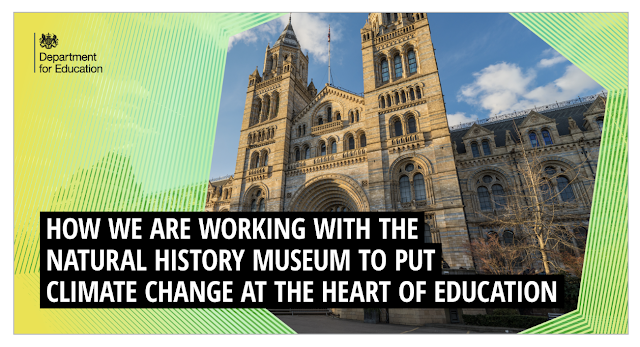The RGS-IBG Summer Bulletin has arrived and shows a number of useful sessions and lectures in the coming months.
There was also update on the work of one of the projects which the RGS are involved with: the National Education Nature Park.
This is being led by the Natural History Museum. Read about it on the link here.
Working with the Department for Education, the project aims to make sure every young person in England has opportunities to develop a meaningful connection to nature, understand the concepts of climate change and biodiversity loss and feels able to do something about it.Together with partners, the Royal Horticultural Society and the Royal Society, it will give students the opportunity to transform the green space at their place of education into their own Nature Park.
From creating pollinator-friendly habitats where biodiversity can thrive, to digging ponds, or creating planting schemes that support climate resilience, students will play leadership roles in studying, managing and enhancing biodiversity and climate resilience in their Nature Park and local community.
With England’s primary and secondary schools covering an area roughly twice the size of Birmingham, this is an opportunity to empower young people to make a real difference by creating environments across the country where biodiversity thrives.
The partnership will be working with Esri UK to provide free geospatial mapping tools so children and young people can track biodiversity gains in their area.
An accompanying awards scheme will recognise the efforts of young people taking environmental action, equipping them with skills and knowledge about biodiversity and sustainability and providing them with a sense of advocacy and an achievement recognised by universities and employers.
The partnership will deliver a comprehensive programme of support and resources for teachers in early years foundation stage, primary and secondary schools. They aim to work with the Department for Education (DfE) to provide grants to ensure that all schools can participate.
Responding to the urgency of the planetary emergency and the DfE's Sustainability Strategy, this is once-in-a-generation opportunity to transform the way we teach climate education and support young people to act and increase biodiversity across England.
What will the National Education Nature Park involve?
The National Education Nature Park will be a network of outdoor spaces in education settings across England, managed by young people and empowering them to make a positive difference to both their and nature’s future.
This pioneering initiative gives young people the opportunity to lead the way in mapping, monitoring and enhancing their learning sites for nature - boosting biodiversity, equipping them with green and digital skills, and enhancing their wellbeing through an increased connection to nature.
Students will choose, plan, and implement a range of site improvements and habitat enhancements based on the latest scientific evidence, and monitor biodiversity gains.
The partnership will deliver a comprehensive, curriculum-based set of free climate education resources, lesson plans, and schemes of work from Early Years Foundation Stage to Key Stages 1-4.
This partnership is led by the Natural History Museum with the Royal Horticultural Society, supported by the Royal Society, the Royal Geographical Society (with IBG)), Manchester Metropolitan University, Learning Through Landscapes, UK Centre for Ecology and Hydrology and the National Biodiversity Network Trust.
This pioneering initiative gives young people the opportunity to lead the way in mapping, monitoring and enhancing their learning sites for nature - boosting biodiversity, equipping them with green and digital skills, and enhancing their wellbeing through an increased connection to nature.
Students will choose, plan, and implement a range of site improvements and habitat enhancements based on the latest scientific evidence, and monitor biodiversity gains.
The partnership will deliver a comprehensive, curriculum-based set of free climate education resources, lesson plans, and schemes of work from Early Years Foundation Stage to Key Stages 1-4.
This partnership is led by the Natural History Museum with the Royal Horticultural Society, supported by the Royal Society, the Royal Geographical Society (with IBG)), Manchester Metropolitan University, Learning Through Landscapes, UK Centre for Ecology and Hydrology and the National Biodiversity Network Trust.
I look forward to seeing the outcomes.

Comments